Motor Vehicle Dealer Bonds by State
Don't see your state? Don't worry, we can still get the bond for you. Click here to get started in any state.
Why Are Auto Dealer Surety Bonds Required?
An auto dealer bond is a requirement to have an auto dealer license issued in your state.
Your state's Department of Motor Vehicles (or licensing agency) mandates this surety bond because they are accrediting you and your business as a licensed authority who has:
- Passed any required examinations
- Structured your business appropriately
- Registered with the necessary state departments
- Setup your dealership or place of business according to the law
- Purchased all the necessary insurance
The state wants to authorize only auto dealerships who will follow the law and provide a service the public can trust. Plus they want the public protected in cases where a dealer or their employees purposefully harm their customers.
What Does an Auto Dealer License Bond Cover?
As you know, there are many types of dealer classifications:
- Franchised dealerships
- Used dealerships
- Wholesale dealers
- Auction dealers
- Salvage dealers
- Recreational vehicle dealers
- Marine vessel dealers
- Motorcycle dealers
- Trailer dealers
Every state has unique dealer classifications and each state has its unique bonding requirements for these classifications.
As we've mentioned, one of the responsibilities of a Department of Motor Vehicles (or licensing agency) is to protect the public from a dealer who financially harms their customers on purpose.
Examples of purposefully misconduct or fraud can include:
- Failing to transfer a title
- Improperly transferring a title
- Creating a false title
- Selling vehicles with no title
- Misrepresenting vehicle information like milage, manufacture year, accident history, or current condition
- Stealing from customer deposits
- Not following licensing laws for the operation of a dealership
- Choosing not to pay all or some of the sales tax on sold vehicles
The amount of financial protection afforded to customers is the surety bond amount determined by your state's Department of Motor Vehicles or licensing agency.
If a dealer or dealership is ever found guilty of any of these actions, the customer or the state, in the case of failing to pay sales tax, can make a claim against the dealer bond for financial reimbursement.
The amount of financial protection only extends to a maximum of the bond amount.
How Much Does an Auto Dealer Bond Cost?
The cost of an motor vehicle dealer bond is based on the bond amount set by your state.
The bond amount is typically determined by looking at recent state-wide customer complaints against all dealerships and the severity of these complaints.
For example:
- New and used car dealer bonds typically have the highest bond amount
- Wholesale dealer bonds may be lower in amount, but not always
- Motorcycle or recreational usually always have a bond amount lower than vehicle dealers
There are two pricing scenarios that determine the price you pay for an auto dealer bond.
1. Fixed Priced Dealer Bonds
Some state's auto dealer surety bonds can be offered at low fixed prices with zero credit check.
We know which sureties (the insurance companies that underwrite surety bonds) offer the best prices for each state's dealer bonding requirement. These bonds can be instantly purchased and issued within one business day.
2. Dealer Bonds Requiring a Quote
The majority of licensed dealer bonds require a quoted rate determined by a surety to determine the price.
The surety is the insurance company that underwrites motor vehicle dealer bonds. The rate quoted multiplied by the bond amount is the price you pay.
Each surety uses their own criteria to determine the rate, but they'll always consider the:
- Personal credit of the individual or ownership team
- Past business and dealership experience
- Prior bond claims (if any) for individuals or owners who have been previous licensed
Surety Bonds Direct is a specialized surety agency. We work with multiple sureties to price shop for you and find the lowest possible price for your bond.
Having helped thousands of dealers in all 50 states purchase their surety bond, we've found typical rates are:
| Level | Rate Range |
|---|---|
| Great industry history and credit | 0.5% - 1% |
| Good industry history and credit | 1% - 3% |
| Average industry history and credit | 3% - 5% |
| Limited industry history and credit | 5%+ |
Find your rate today by starting our free quote process. We'll price shop for you and find the lowest pricing, plus there's no obligation to purchase once you receive your pricing.
You can get started by using our free online quote form or by calling a bond specialist at 1-800-608-9950.
Get Your Bond Pricing Today
You can get pricing for your auto dealer surety bond. Click the button below. You need to know the amount of your bond.
Need Help? Call Us Today
Talk to a bond specialist today. They will help you find the surety bond you need and get you the lowest possible price. 1-800-608-9950
How Long Does It Take To Get an Auto Dealer Bond?
Scenario 1: Within Hours
If the bond you require is available for instant purchase. You can buy your bond right now and typically receive your bond within a few hours to within one business day.
We process all customer surety bonds in the order we receive them.
Scenario 2: 1 to 2 Business Days
For dealer bonds that require a quoted rate from a surety, the process typically takes 1 to 2 business days to have your bond in hand. This is because our bond specialists are working with multiple sureties to collect quotes. We know that we need to offer you the best price in the market to earn your business.
Once you receive pricing, purchasing the bond is as easy and simple as purchasing anything online.
What Happens After You Purchase Your Auto Dealer Bond?
After you purchase your bond, we'll send it to you based on the requirements of the Department of Motor Vehicles or your specific licensing agency (the obligee).
Depending these requirements for your state and the surety writing the bond, you may need to sign an agreement (usually online) before we can send the bond to you.
Emailing Dealer Bonds
I most cases, we're able to prepare your bond electronically and email you the bond. Your licensing agency may require you to print and sign the paper copy, but email saves you considerable time.
Physically Mailing Dealer Bonds
Some state licensing agencies require the original bond to be physically signed and submitted with the application. In these cases, we have to mail the bond to you. Unfortunately as your agent, we don't have any control over this requirement, but we do offer expedited shipping options if you're in a hurry.
This is the primary reason you should avoid pushing off purchasing your dealer bond. You don't want to miss an application deadline because you just discovered your state's Department of Motor Vehicles requires the original bond.
Get the quote process started today with our free online quote form or call an auto dealer bond specialist at 1-800-608-9950.
How Long Does an Auto Dealer Bond Last?
Auto dealer bonds are required to remain active for the lifetime of your dealership business.
Every motor vehicle dealer bond has a bond term, or length of time the bond remains active, at which time the bond must be renewed.
Most dealer bonds are continuous. A continuous bond means the original surety bond you submitted with your application will remain on file and active as long as you pay the renewal premium when your bond renews.
You won't have to resubmit a new bond every time your bond renews.
The only factor you must pay attention to is your bond renewal date. That said, we work hard to ensure our customers are aware of upcoming renewals well in advance of the deadline. We also explore options to improve your price at renewal.
Most auto dealer bonds renew on a yearly basis. However, there are many states with multi-year bond terms and some with fixed expiration dates.
Working with Surety Bonds Direct makes the renewal process easy. As your renewal date approaches, your bond specialist will contact you 30 to 45 days in advance to make sure you don't miss your renewal date.
Start Your Auto Dealer Bonding Process Today
Select your state.
You'll find an easy to read grid of the dealer bonds required in your state. Choose the bond or bonds you require to fulfill your licensing requirements.
Fill out our online quote form and a bond specialist will immediately start shopping to find you the lowest possible price.
If you prefer, call a bond specialist at 1-800-608-9950 and you can start the quote process over the phone.
If this is your first time getting an auto dealer license, refer to our blog. We have outlined the licensing process for your state.
Get Your Bond Pricing Today
You can get pricing for your auto dealer surety bond. Click the button below. You need to know the amount of your bond.
Need Help? Call Us Today
Talk to a bond specialist today. They will help you find the surety bond you need and get you the lowest possible price. 1-800-608-9950
Get a Motor Vehicle Dealer Bond in Your State
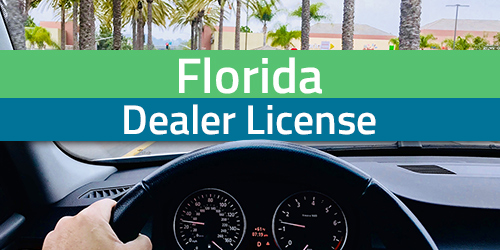
4 Steps To Get Your Florida Auto Dealer License
Getting your Florida auto dealer license is not difficult to get. But make sure you follow the rules we outline in this post.
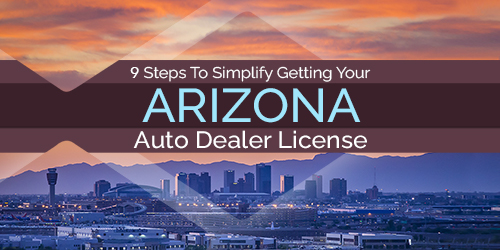
5 Steps To Get Your Arizona Auto Dealer License
Here are the simplified steps to get your Arizona auto dealer license. Plus you'll find all the fees and helpful links to make this process easy.
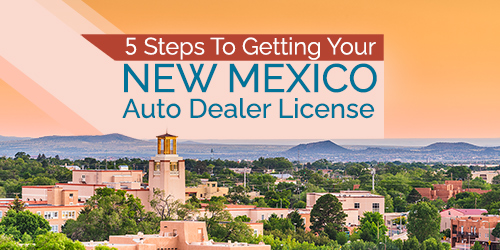
5 Steps To Getting Your New Mexico Auto Dealer License
Here are the steps to get a New Mexico auto dealer license and all of the details you need to know to get your application approved on first submission.
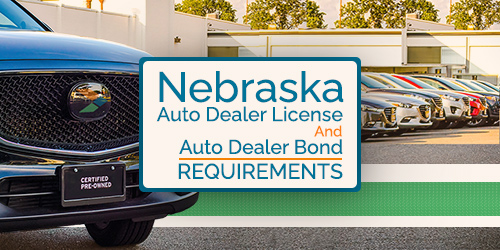
How To Get A Dealers License In Nebraska And Your Auto Dealer Bond
Every year Nebraska auto dealer licenses expire December 31st. Here's how to get your Nebraska auto dealer license and auto dealer bond step by step.
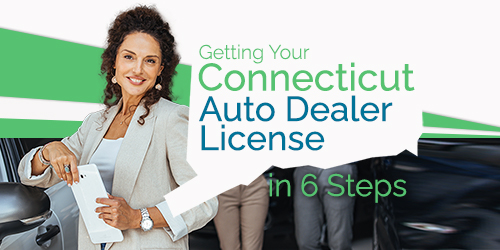
How To Get Your Connecticut Auto Dealer License
We've taken the steps to get your Connecticut auto dealer license and made them simple to follow. Here's everything you need. Let's go!

Michigan Auto Dealer Bond Update And 2023 Breaking News
Effective January 23rd, 2023 Michigan Auto Dealer bonds are having their amount increased from $10k to $25k. Learn about the change and make sure you're ready.
Can't find what you're looking for? Let us help!
Get Started » or, if you'd prefer, call us at
(No obligation, takes 2 minutes)


